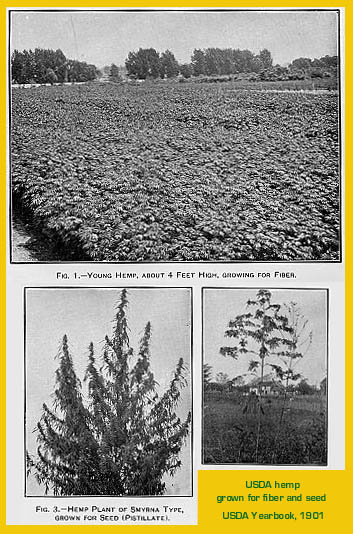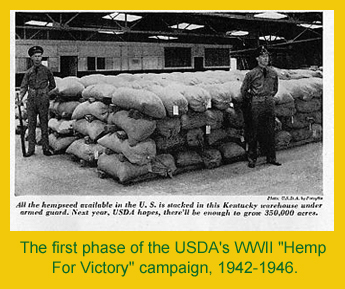
Industrial Marijuana

Quotes

 Presently, hemp cultivation is banned under federal law. Even new strains of hemp, which have a THC level so low that they would be of no value to the drug culture whatsoever, are illegal for growth in the U.S.
Presently, hemp cultivation is banned under federal law. Even new strains of hemp, which have a THC level so low that they would be of no value to the drug culture whatsoever, are illegal for growth in the U.S.
The horrible hoax here is that industrial hemp is allowed for in both the 1937 Marijuana Tax Stamp Act, and the Controlled Substance Act of 1970. “The term marihuana means all parts of the plant Cannabis sativa L., whether growing or not; the seeds thereof; the resin extracted from any part of such plant; and every compound, manufacture, salt, derivative, mixture, or preparation of such plant, its seeds, or resin -- but shall not include the mature stalks of such plant, fiber produced from such stalks, oil or cake made from the seeds of such plant, any other compound, manufacture, salt, derivative, mixture, or preparation of such mature stalks (except the resin extracted therefrom), fiber, oil, or cake, or the sterilized seed of such plant which is incapable of germination.”
Industrial hemp cannot be grown, however, without a federal permit issued by the DEA. And although the DEA claims to consider all requests, no one has legitimately grown hemp on mainland U.S. soil since 1958 due to prohibitive regulations imposed by the DEA!
The reason is this; you cannot manufacture a mature stalk! From the time of planting to the time of maturity you are manufacturing a controlled substance, marijuana. Even the seed, which is unsterilized, is considered a controlled substance. And when the few people who have attempted to grow industrial hemp have had their crops analyzed by the DEA, the plants are not tested for their THC levels but solely for whether or not they are marijuana. Which they always are!
For the simple act of growing cannabis in America, individuals can lose their jobs and their parental rights, have their properties and assets seized and forfeited, and receive enormous bails, fines and prison sentences with no chance of parole. Under the 1988 Anti-Drug Abuse Act, the federal government can impose the death sentence for a marijuana farming enterprise, even if no violent crime has occurred.
Elsewhere in the world, countries in Asia, the European Community, and recently Canada legally farm hemp for textiles, plastics, food, beer, paper, oil and other products. And, in spite of its illegalization in the U.S., both Virginia and Montana have formally called for an end to the federal ban on hemp. Virginia's resolution states "that the histories of the United States and Virginia are replete with examples of the utility of and dependence on industrial hemp, which was legally cultivated in Virginia and in many other states until the 1930s." Hawaii is currently experimenting with industrial hemp cultivation, and New Mexico, Minnesota, West Virginia, Kentucky and Vermont all have passed laws to start experimental hemp cultivation. Other states -- New Hampshire, North Dakota, and Tennessee, to name a few -- are also considering pro-industrial hemp laws.
The federal government’s response came in the ONDCP Statement on Industrial Hemp (1997): "Hemp is a novelty product with limited sustainable development value even in a novelty market. For every proposed use of industrial hemp, there already exists an available product, or raw material, which is cheaper to manufacture and provides better results.
"In conclusion," the statement continues, "legalizing hemp production would send a confusing message to our youth concerning marijuana. Also it may lead to the de facto legalization of marijuana cultivation. To date, production of hemp appears to offer no relief to farmers or manufacturers of textiles or paper as an alternative crop or product. Certainly any new credible evidence should be given careful consideration. However, the current available facts do not support hemp cultivation as a legally or economically viable option for U.S. interests. ONDCP therefore does not consider it prudent to change the current status of Cannabis Sativa as a controlled Schedule 1 drug."
The USDA followed with the Agriculture Department’s Economic Research Service Study: "Hemp, the non-hallucinogenic cousin of marijuana, can be used for both clothing and food, but there would be a ‘small, thin market’ for the crop. All of the hemp fiber, yarn, and fabric that the U.S. currently imports could be grown on less than 2,000 acres of land."
First, hemp is not marijuana’s "cousin" (as if the two were totally different plants). Marijuana is the leaf and the fruit of the cannabis hemp plant. Hemp is the fiber produced from the stalk and the oil produced from the seed of the cannabis hemp plant.
Second, how can a plant from which the word canvas is derived be a novelty product? According to archeological records, cannabis hemp was probably man’s first cultivated crop and remained the world’s largest agricultural crop through the 1800s, being spread all over the world for its many vast uses. The word canvas itself is a testament to early man’s survival, including shelter, clothing, sails, and a medium for recording his art and history. And the Biblical command to “be fruitful and multiply, and fill the earth” was achieved through the rigging and sails made from hemp on nearly all the world’s sea-going vessels.
Next our government claims that "all the hemp the U.S. currently imports could be grown on 2,000 acres." Of course, hemp is illegal and there is no U.S. hemp market. All the government’s comparisons of hemp’s cost versus profits are based on industrial and financial reports from before its illegalization in 1937. And why is the U.S., still to this day, importing this "novelty item"?
And finally, the fact that "for every use of industrial hemp, there already exists an available product" is the one real reason why industrial hemp -- and not just marijuana -- has been illegal in our country since 1937.
 The hemp seed is one of the highest sources of protein and the number-one source of essential fatty acids. It is still a major food staple for many people in the eastern world. Hemp seed was the world's most used birdseed right up until its prohibition. Birds will pick the hemp seeds out of a pile of mixed seed and eat them first. Hemp seed oil was the main base for
the planet’s paints and varnishes and was the world's most consumed lighting oil for thousands of years. It was also used as lubricating oil, even as recently as World War II on U.S. war ships.
The hemp seed is one of the highest sources of protein and the number-one source of essential fatty acids. It is still a major food staple for many people in the eastern world. Hemp seed was the world's most used birdseed right up until its prohibition. Birds will pick the hemp seeds out of a pile of mixed seed and eat them first. Hemp seed oil was the main base for
the planet’s paints and varnishes and was the world's most consumed lighting oil for thousands of years. It was also used as lubricating oil, even as recently as World War II on U.S. war ships.
The fiber from the cannabis hemp plant is the strongest natural fiber in the world. From it man has produced everything from the finest linens to
the strongest ropes, sails, and tents for thousands of years. Even the first American flags were made out of hemp. The fiber is also a chemical-free source of paper, and was used worldwide since 600 A.D., for
everything from books to money and documents, including both drafts of the Declaration of Independence. Benjamin Franklin used hemp in America’s first paper mill. Hemp’s cellulose fibers were also used in the manufacture of dynamite and TNT.
The study of the hemp fiber by the U.S.'s largest powder company, Du Pont, led to the development of the first synthetic fiber, Rayon. Hemp’s cellulose observation was also the basis of our plastics, (Celluloid, Acetate, etc.) and the duplication of these fibers produced Nylon, the world’s strongest synthetic fiber. This company also produced the chemicals that make up synthetic varnishes and paints, and the chemicals used in the wood-paper process.
"The chemist has aided in conserving nature by developing synthetic products to supplement or wholly replace natural products," said Lammont Du Pont, company president.
In 1937, the entire hemp industry was illegalized through the lie that marijuana was the most violent drug known to man. In this same year, Du Pont patented Nylon and the chemical process of making paper from wood.
Hence, the reason that industrial hemp is illegal: a lie. And every year hundreds of thousands of Americans are arrested to cover up this lie.
Hemp is no “new crop” with an unknown market in America. It has thousands of years of history as evidenced in the 1942 USDA film Hemp for Victory:
"Long before these ancient Greek temples were new, hemp was already old in the service of man."
Similarly, the books of Psalms 104:14 reads, "He maketh the grass for the cattle, and herb for the service of man."'
President George Washington said, "Make the most of the hemp seed. Sow it everywhere."
230 years later, president George W. Bush's DEA, under the direction of Karen Tandy, is trying to crush the hemp seed out of existence.

Quotes

Email the hemphistorian
Copyright © 2001 kgs. All rights reserved.
edited and designed by joseyhill
 The hemp seed is one of the highest sources of protein and the number-one source of essential fatty acids. It is still a major food staple for many people in the eastern world. Hemp seed was the world's most used birdseed right up until its prohibition. Birds will pick the hemp seeds out of a pile of mixed seed and eat them first. Hemp seed oil was the main base for
the planet’s paints and varnishes and was the world's most consumed lighting oil for thousands of years. It was also used as lubricating oil, even as recently as World War II on U.S. war ships.
The hemp seed is one of the highest sources of protein and the number-one source of essential fatty acids. It is still a major food staple for many people in the eastern world. Hemp seed was the world's most used birdseed right up until its prohibition. Birds will pick the hemp seeds out of a pile of mixed seed and eat them first. Hemp seed oil was the main base for
the planet’s paints and varnishes and was the world's most consumed lighting oil for thousands of years. It was also used as lubricating oil, even as recently as World War II on U.S. war ships.

 Presently, hemp cultivation is banned under federal law. Even new strains of hemp, which have a THC level so low that they would be of no value to the drug culture whatsoever, are illegal for growth in the U.S.
Presently, hemp cultivation is banned under federal law. Even new strains of hemp, which have a THC level so low that they would be of no value to the drug culture whatsoever, are illegal for growth in the U.S.